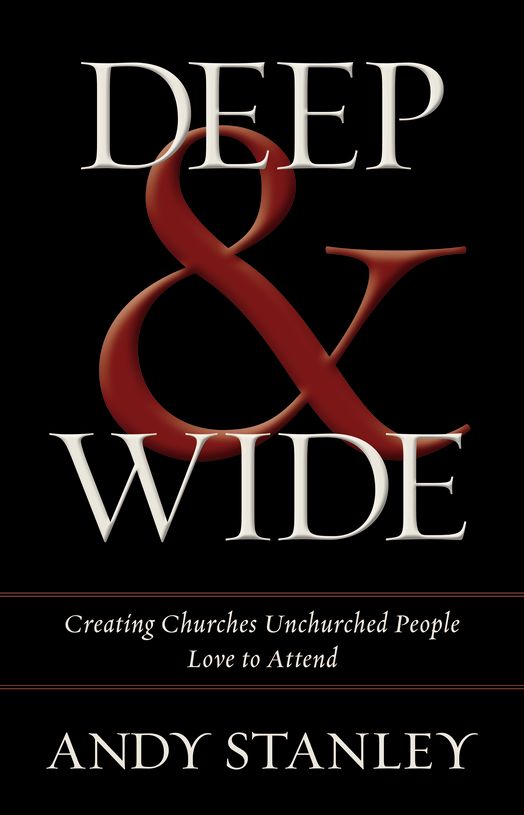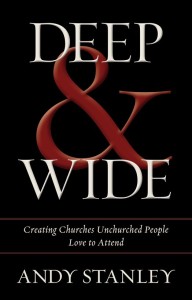Book Review: Deep & Wide

 Last week, I was able to finish reading Andy Stanley’s new book Deep & Wide. This is a book about Northpoint’s philosophy on creating a church that unchurched people would love to attend. Andy Stanley has proven to be a leading voice in the area of church leadership. While I may not agree with all his terminology, I found myself highlighting passage after passage in the book that I strongly agree with. I simply love his focus on reaching people for Christ.
Last week, I was able to finish reading Andy Stanley’s new book Deep & Wide. This is a book about Northpoint’s philosophy on creating a church that unchurched people would love to attend. Andy Stanley has proven to be a leading voice in the area of church leadership. While I may not agree with all his terminology, I found myself highlighting passage after passage in the book that I strongly agree with. I simply love his focus on reaching people for Christ.
The first part of the book reveals a very personal and insightful look at Andy’s relationship with his father, Pastor Charles Stanley of Atlanta’s First Baptist Church. The book reveals the reasons behind Andy’s departure from his father’s church and the start of Northpoint. I found this to be the most interesting part of the book as he shared a very personal glimpse into his own relational struggles. The book then transitions into presenting a case for Northpoint’s mission, vision, and strategy which Andy shares as the following:
OUR MISSION … to lead people into a growing relationship with Jesus Christ. OUR STRATEGY … to create churches where people are encouraged and equipped to pursue intimacy with God, community with insiders, and influence with outsiders.
The book concludes with a section on Spiritual formation and their strategy that centers around five faith catalysts: Practical Teaching, Private Disciplines, Personal Ministry, Providential Relationships, and Pivotal Circumstances. I found this to be both a simple and profound section that really provided a good understanding of how people grow in their faith.
This is a book I would recommend to any church planter or pastor. I feel that it doesn’t glamorize church planting or Northpoint, but it gives a true glimpse into the hardship of starting a church and keeping a church focused on the vision and mission.
Great Quotes From the Book
- I think every church should be a church irreligious people love to attend. Why? Because the church is the local expression of the presence of Jesus. We are his body. And since people who were nothing like Jesus liked Jesus, people who are nothing like Jesus should like us as well.
- All my critics are religious people. (It may be the only thing I have in common with Jesus.)
- …healthy local churches can be, and should be, both deep and wide. It’s not either/ or. It’s both/ and. Local churches should be characterized by deep roots and wide reaches. Churches should be theologically sound and culturally relevant. We should be bold in our proclamation and winsome in our approach. In the Gospels we find in Jesus the embodiment of both. As his body, we should be as well.
- In the beginning, the church was a gloriously messy movement with a laser-focused message and a global mission.
- One of the fundamental realities of organizational life is that systems fossilize with time. The church is no exception.
- An ekklesia was simply a gathering or an assembly of people called out for a specific purpose. Ekklesia never referred to a specific place, only a specific gathering.
- Are we moving or simply meeting? Are we making a measurable difference in our local communities or simply conducting services? Are we organized around a mission or are we organized around an antiquated ministry model inherited from a previous generation? Are we allocating resources as if Jesus is the hope of the world or are the squeaky wheels of church culture driving our budgeting decisions? Are we ekklesia or have we settled for kirche.
- We are not mistakers in need of correction. We are sinners in need of a Savior. We need more than a second chance. We need a second birth.
- Policies and white papers don’t work well in a church that commits to embrace the mess created by grace and truth. It’s virtually impossible to be consistent or fair when grace and truth become driving forces in a local congregation.
- We walk toward the messes.
- our messages and lesson preparations are not complete until we know what we want our audiences to do with what they are about to hear. To grow our congregants’ faith, we must preach and teach for life change.
- Pastors, preachers, and teachers who are not gifted in the area of leadership default to management. Best-case scenario, they take what’s handed to them and nurture it, protect it, defend it, and in some cases, improve it. Worst-case scenario, they focus on pastoring, preaching, and teaching, and delegate key leadership decisions to committees.
- If our church suddenly ceased to exist, would our community miss us? If so, why? What value do we bring to our community? How do people outside our church view our church?




